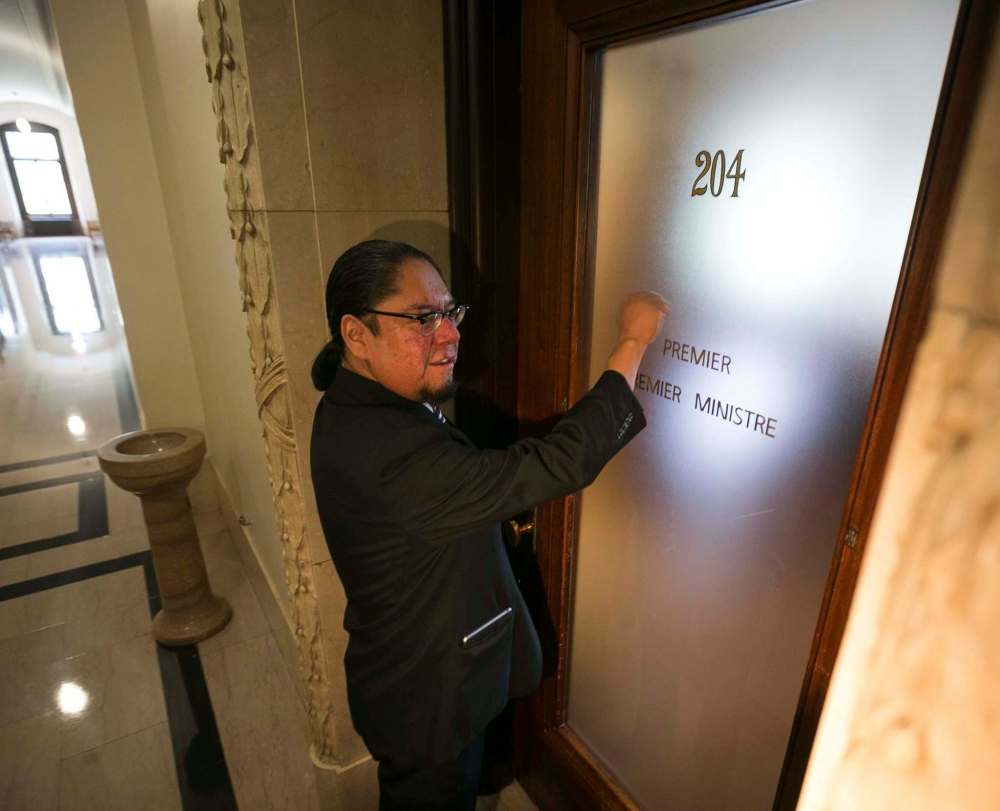Push for stat holiday has Manitoba roots
Aboriginal leaders advocated for national day of reconciliation
Advertisement
Read this article for free:
or
Already have an account? Log in here »
To continue reading, please subscribe:
Monthly Digital Subscription
$0 for the first 4 weeks*
- Enjoy unlimited reading on winnipegfreepress.com
- Read the E-Edition, our digital replica newspaper
- Access News Break, our award-winning app
- Play interactive puzzles
*No charge for 4 weeks then price increases to the regular rate of $19.00 plus GST every four weeks. Offer available to new and qualified returning subscribers only. Cancel any time.
Monthly Digital Subscription
$4.75/week*
- Enjoy unlimited reading on winnipegfreepress.com
- Read the E-Edition, our digital replica newspaper
- Access News Break, our award-winning app
- Play interactive puzzles
*Billed as $19 plus GST every four weeks. Cancel any time.
To continue reading, please subscribe:
Add Free Press access to your Brandon Sun subscription for only an additional
$1 for the first 4 weeks*
*Your next subscription payment will increase by $1.00 and you will be charged $16.99 plus GST for four weeks. After four weeks, your payment will increase to $23.99 plus GST every four weeks.
Read unlimited articles for free today:
or
Already have an account? Log in here »
Hey there, time traveller!
This article was published 17/08/2018 (2675 days ago), so information in it may no longer be current.
A national statutory holiday to recognize the history of Indian residential schools not only has support in Manitoba, it has roots here.
While Prime Minister Justin Trudeau moved forward with statements in Quebec about Ottawa’s plans for a new national day of reconciliation, Indigenous leaders and advocates in Manitoba recalled how this province laid important cornerstones for it.
Manitoba First Nations were among the Indigenous leaders who backed a national day of reconciliation to commemorate the dark chapter of residential schools when the national Assembly of First Nations formally endorsed a Winnipeg MP’s private member’s bill for it in 2016.

The day will be aimed at remembering the legacy of residential schools and reflecting on a path toward reconciliation, Trudeau said in Saint-Eustache, Que., Thursday.
Ottawa plans to use an opposition bill to make it happen. NDP MP Georgina Jolibois introduced a private member’s bill that proposes establishing a statutory holiday on June 21, which currently recognizes National Indigenous Peoples Day.
Manitoba Metis Federation president David Chartrand said the Manitoba Métis support a statutory holiday, provided the provinces and territories support the federal government and also declare it.
Provinces would have to amend their labour codes for the day to be considered a statutory holiday beyond the authority of the federal civil service, something the Manitoba government wasn’t prepared to comment on until legislation is tabled in Ottawa.
“In regards to the federal announcement, we will address this issue if and when the federal government proceeds,” a provincial spokeswoman said by email Thursday.
Outside the provincial corridors of power, the concept goes back decades in Indigenous circles here.
Chartrand said he’d favour setting aside June 21, the National Indigenous Peoples Day, as the date for a new national holiday that people and governments could plan on year after year.
“June 21 is a date Canadians have accepted already… and it should be something like Reconciliation Day, not just for one event, or to showcase First Nations, Inuit or Métis cultures,” the Manitoba Métis leader said.
“There’s an exchange coming, with more and more cultures moving to Canada, so this would be a date where everyone can get to know who Indigenous people are, what happened to us and why Indigenous people still find themselves living in Third World conditions,” Chartrand said.
The current incarnation of the bill Ottawa proposes to use is not unlike the one Liberal Winnipeg Centre MP Robert-Falcon Ouellette introduced two years earlier. It was a Manitoba initiative.
Manitoba Indigenous community volunteer and writer Maeengan Linklater drafted the bill initially with the provincial legislature in mind.
It echoed the Truth and Reconciliation Commission’s (TRC) call to action and exhaustively researched the links between residential schools and the genocide against Canada’s Indigenous people.
The community volunteer delivered it to the three political parties at the provincial legislature June 5, 2015.
Linklater then redrafted the Manitoba Indian Residential Schools Genocide and Reconciliation Memorial Day Act, working with Ouellette who introduced it as a private member’s bill Oct. 31, 2016.
The bill by Jolibois builds on the earlier efforts, Linklater said Thursday.
“If the federal government is going to present this, it’s an opportunity to commemorate and reflect on the Indian residential school system.
“That’s an opportunity for reconciliation and to make people remember and acknowledge this is Canada’s past,” Linklater said.
On a more personal level, Linklater said the day would also be a way to acknowledge Indigenous families and give them a day to celebrate their lives together.
The Indigenous leader credited as the architect for the billion-dollar court-ordered residential school settlement that established the TRC is former national chief Phil Fontaine from Sagkeeng First Nation, located 120 kilometres north of Winnipeg.
Also from Manitoba is the lead commissioner for the TRC, which made the statutory day an official call to action — former judge and current Sen. Murray Sinclair.
The other obvious provincial link is the National Centre for Truth and Reconciliation, which is based at the University of Manitoba.
Ryan Moran, the centre’s director, applauded the federal call in an email Thursday.
“We are pleased to see the federal government moving ahead on this call to action. Each and every call to action is important, this particular one is critically important in terms of remembering and honouring the children and the families that were affected,” Moran said.
“It will give us a national opportunity to reflect on the harms done and the path of healing moving forward,” he said.
alexandra.paul@freepress.mb.ca


![CP
]](https://dev.winnipegfreepress.com/wp-content/uploads/sites/2/2022/04/Mba_Conflict_Report_201804241.jpg?w=100)